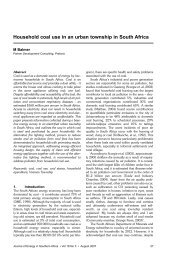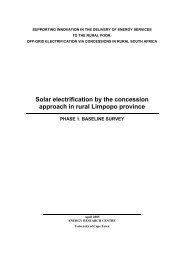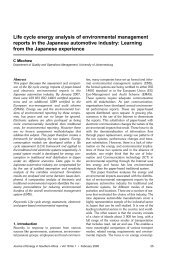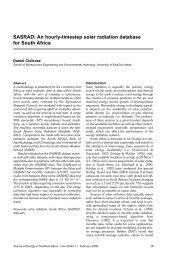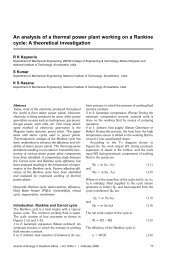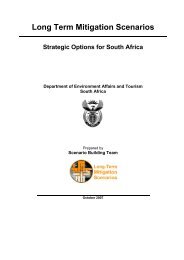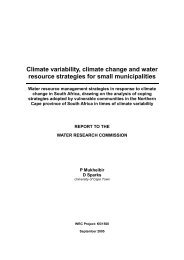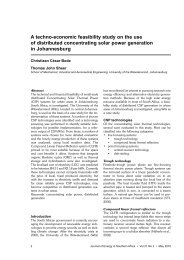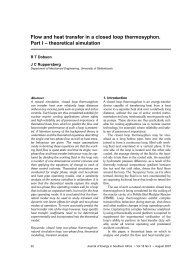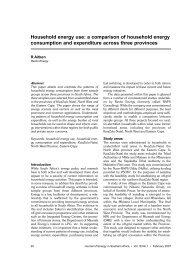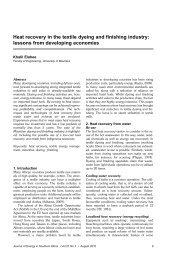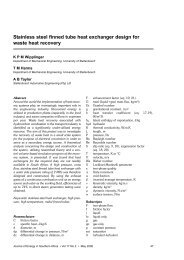(Ed) 2006. Energy policies for sustainable development in South Africa
(Ed) 2006. Energy policies for sustainable development in South Africa
(Ed) 2006. Energy policies for sustainable development in South Africa
Create successful ePaper yourself
Turn your PDF publications into a flip-book with our unique Google optimized e-Paper software.
ENERGY POLICIES FOR SUSTAINABLE DEVELOPMENT IN SOUTH AFRICA: EXECUTIVE SUMMARY<br />
coal used <strong>for</strong> electricity generation is analysed. Such economic <strong>in</strong>struments could be<br />
extended to coal <strong>for</strong> synthetic fuel (synfuel) production and <strong>in</strong>dustrial use. Alternatively, the<br />
environmental outputs could be taxed directly, e.g. <strong>in</strong> a pollution tax, although this is not<br />
analysed <strong>in</strong> this study.<br />
Key results<br />
Key results are presented <strong>in</strong> Chapters 9, 10 and 11, and a summary of quantitative results<br />
can be found <strong>in</strong> the appendix. Important f<strong>in</strong>d<strong>in</strong>gs and conclusions are as follows:<br />
On the demand-side, energy efficiency <strong>policies</strong> were found to be particularly important.<br />
The overall strategy of reduc<strong>in</strong>g f<strong>in</strong>al energy demand by 12% compared to bus<strong>in</strong>ess-asusual<br />
can be implemented most effectively <strong>in</strong> the <strong>in</strong>dustrial sector. Industrial energy<br />
efficiency is effective both <strong>in</strong> lower<strong>in</strong>g the cost of the energy system by R18 billion over 25<br />
years, and <strong>in</strong> reduc<strong>in</strong>g global and local air pollution. Carbon dioxide emissions are reduced<br />
by 770 Mt CO 2 over 25 years. Greater efficiency has benefits <strong>in</strong> delay<strong>in</strong>g the need <strong>for</strong><br />
<strong>in</strong>vestment <strong>in</strong> power stations, with new base load power stations postponed by four years,<br />
and peak<strong>in</strong>g power plant by three years.<br />
Higher energy efficiency <strong>in</strong> <strong>in</strong>dustry. Realis<strong>in</strong>g the potential <strong>for</strong> <strong>in</strong>dustrial energy efficiency<br />
requires <strong>for</strong>ceful and determ<strong>in</strong>ed, even aggressive, implementation. Current practice is<br />
often not economically optimal and clear signals are needed to <strong>in</strong>duce <strong>in</strong>dustry to <strong>in</strong>vest <strong>in</strong><br />
options that must be shown to make f<strong>in</strong>ancial sense. The agreement between <strong>in</strong>dustry and<br />
government to implement the energy efficiency strategy (DME 2005a), and the recent<br />
announcement that a dedicated <strong>Energy</strong> Efficiency Agency is to be established, bode well <strong>in</strong><br />
this regard.<br />
New commercial build<strong>in</strong>gs designed more efficiently. A strong legal and <strong>in</strong>stitutional<br />
framework is needed <strong>for</strong> the commercial sector. The modell<strong>in</strong>g suggests that a 12% energy<br />
efficiency target is achievable and can save R13 billion over 25 years. However the results<br />
also suggest that the cost of optimal energy efficiency improvements are 2-3% lower than<br />
the 12% of the government target and that these sav<strong>in</strong>gs thus come at a cost (which works<br />
out at about 5% of <strong>in</strong>vestment costs). Government can play an important role here by<br />
tak<strong>in</strong>g the lead <strong>in</strong> mak<strong>in</strong>g its own build<strong>in</strong>gs and practices more efficient.<br />
Cleaner and more efficient use of energy <strong>in</strong> the residential sector. The residential sector is<br />
particularly important <strong>for</strong> social susta<strong>in</strong>ability. A <strong>susta<strong>in</strong>able</strong> <strong>development</strong> approach aims to<br />
deliver services that meet basic human needs, but <strong>in</strong> a cleaner and more efficient manner.<br />
The policy <strong>in</strong>terventions that are modelled focus on end uses – solar water heaters and<br />
geyser blankets, liquid petroleum gas <strong>for</strong> cook<strong>in</strong>g, efficient hous<strong>in</strong>g shells, and compact<br />
fluorescent lights (CFLs) <strong>for</strong> light<strong>in</strong>g. Mak<strong>in</strong>g social hous<strong>in</strong>g more energy-efficient through<br />
simple measures, such as <strong>in</strong>clud<strong>in</strong>g <strong>in</strong>sulat<strong>in</strong>g <strong>in</strong> ceil<strong>in</strong>gs, should be adopted as a general<br />
policy.<br />
All policy cases assume near-universal electrification, and <strong>in</strong> the residential case we f<strong>in</strong>d<br />
that the share of other commercial fuels (LPG and paraff<strong>in</strong>) also <strong>in</strong>creases. Overall fuel<br />
consumption, however, is lowered compared to the base case (8.13 PJ less <strong>in</strong> 2025),<br />
because of <strong>in</strong>creas<strong>in</strong>g efficiency and the use of solar energy <strong>for</strong> water heat<strong>in</strong>g. Not all<br />
<strong>in</strong>terventions are used by all household types – <strong>for</strong> example, energy efficient houses are<br />
only taken up by urban higher-<strong>in</strong>come electrified households. The lower costs of geyser<br />
blankets – both upfront costs and costs per unit of energy saved – suggests that geyser<br />
blankets are appropriate policy <strong>in</strong>terventions <strong>in</strong> poor electrified households.<br />
Access to energy <strong>in</strong> physical terms needs to be accompanied by af<strong>for</strong>dability <strong>in</strong> economic<br />
terms. The f<strong>in</strong>d<strong>in</strong>gs suggest that a relatively small subsidy can make energy efficiency<br />
xi



